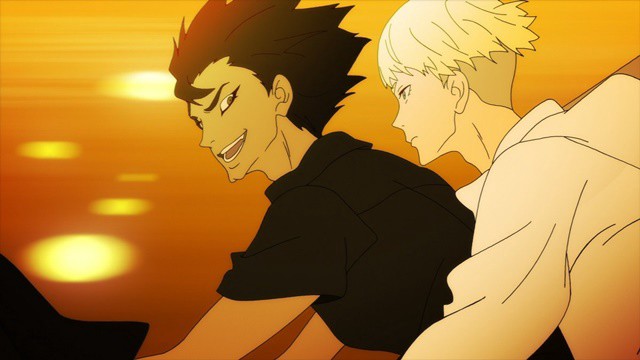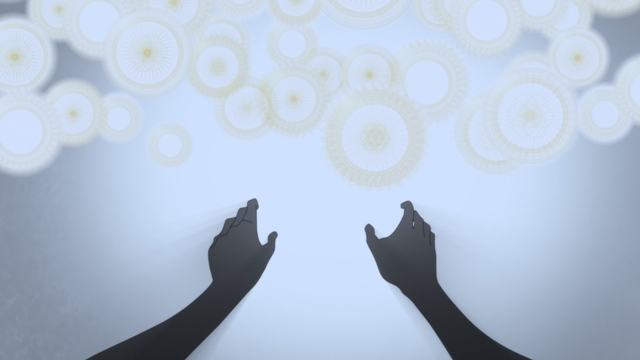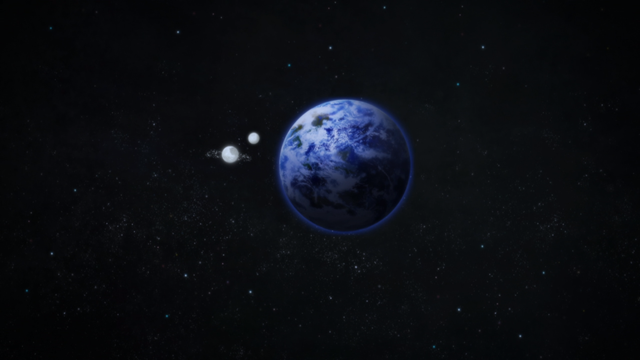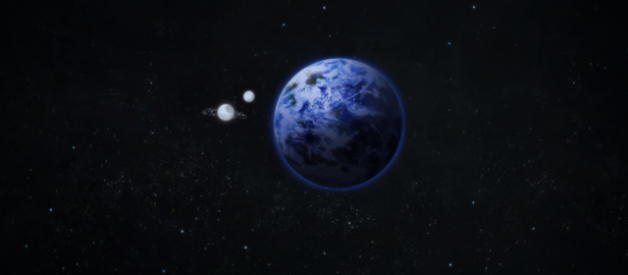
I?ve always been intrigued by the Devil, as a character. From John Milton?s Paradise Lost to Masaaki Yuasa?s Devilman Crybaby, Satan?s defiance of God is one of the most intriguing acts across all forms of storytelling. Why does he do it? Are his actions justified? What does a benevolent God hope to accomplish by casting out his creation? The questions that defiance raises, and the lessons gleaned from that decision, are perfectly reflected in this latest Netflix sensation.
? MAJOR SPOILERS FOLLOW ?
Love DOES exist. Therefore, there IS sadness
The series opens with some of its biggest themes right out in the open, though it attempts to obfuscate them by initially presenting their opposites. Ryo Asuka states as the first lines of the series that he believed love does not exist, therefore there is no sadness. He intentionally says this in the past-tense (foreshadowing his change of heart), but the viewer is likely too busy trying to acclimate to notice or remember until Ryo finishes the sentiment during one of the closing scenes.
Regardless, Devilman Crybaby is entirely about the existence of love and sadness, as well as their importance to a fulfilling life. Akira Fudo serves as the main vehicle for proving these ideals, but Miki Makimura, Miko Kuroda and many other characters in the cast also reinforce the same concepts.
The way Devilman Crybaby defines or portrays love is very nuanced. Sex is another front-and-center aspect of this series, and is inherently entangled with the concept of love ? but Devilman is primarily concerned with something more intimate. Love is Akira choosing to save Miki from Ryo at the risk of having his secret exposed. Love is the way Kozo Makimura chose to defend his demon-possessed son from the military, despite the fact that Taro had killed his mother. Love is Miki accepting Akira in his new state, despite the violent acts she saw him commit during Ryo?s broadcast. The point is, love is about how our relationships encourage us to act selflessly.
What?s also interesting is that, while hate is often described as the opposite of love, Devilman Crybaby uses sadness as its foil, instead. This creates an affect where a negative emotion often directed at others is replaced with a negative emotion that a person has to deal with internally. In this way, hatred can emerge as a shade of sadness ? a la Miko hating Miki when in truth she was sad that she couldn?t compete with her in track ? but it never becomes the primary emotion.
This builds the foundation for Ryo?s redemption, and it?s important that he ends the series as a sad character instead of a hateful one. While his rebellion against God and his hatred for the weakness of humanity might seem to reveal his true feelings, they actually belie the sadness underneath.
The consequences of being cast out

Ryo, after revealing himself as Satan, tells the viewer that he was cast out of heaven after challenging God. This is his source of his motivation, subconscious or otherwise, for much of the series. That being said, the crux of the story rests on understanding why he defied God in the first place.
To understand this, we have to do some extrapolating from the only explicit clue we?re given: Satan?s description of God as ?icy.? There are many ways to interpret a single adjective from an unreliable point of view, but understanding Ryo?s personality paints a bigger picture.
The first brushstroke leads us once more to the beginning and end of the series, in Ryo?s proclamation that love and sadness do not exist. These are not the underlying pillars that hold up the universe, but rather the underlying pillars that hold up his character. We constantly see him act on these beliefs, too, in both the many flashbacks to his childhood and in his actions in the present. For the most part, he displays a complete inability to understand either love or sadness when expressed by anyone ? himself included. After all, he clearly has always loved Akira despite not understanding that feeling until the end of the series.
And therein lies the rub. Up until the final moments of Devilman Crybaby, Ryo does not understand love or sadness. Thus, one can infer that perhaps calling God ?icy? refers to a lack of love felt from his creator. After all, if he was surrounded by a whole host of angels who do understand and feel God?s love, defiance is a fitting reaction. Children who do not understand or know how to properly express their emotions throw tantrums all the time. Whatever outburst Satan had that caused his expulsion from heaven follows the same logic.
Now that we understand what pushed Satan to rebel, it?s important to try and understand what God hoped to achieve by kicking him out of Heaven. Doing so seems rather subjective, but if we remember that one of the series? themes is the importance of love and its relation to sadness, it?s possible to decide on an interpretation that stays consistent with that theme.
A lesson, not a punishment

After finishing Devilman Crybaby, I saw some takes that viewed Satan?s time on Earth as a punishment for rebellion. That?s a perfectly fine head-cannon, but it seems completely inconsistent with love as a theme of the show, to me. A show about love would not contain a God (a being traditionally described as all powerful and all loving) who would punish any of his creations for anything. Even if you try to justify it as a punishment through the lens of sadness, that is a distortion of how Devilman Crybaby portrays sadness. It is inextricable from love. It not an end in and of itself, but a means to one.
With that being the case, it makes much more sense that God expelled Satan from Heaven to teach him the error of his ways. What were his ways again? Not understanding love. And what does Ryo learn at the end of his relationship with Akira? That love exists, that he is sad about losing Akira and that both emotions are important. You can really feel it at the end of the series in the way he cradles Akira?s bisected corpse and sobs with more emotion than he had previously ever displayed.
Of course, this whole argument relies on the acceptance of love as a central theme to the show. I?ve already listed a handful of examples of love spread throughout the series, but a single moment in the final episode encapsulates it more than any other: the baton scene you see in the gif at the beginning of this section.
While love is a huge theme in the show, this scene uses the relay race as a perfect allegory. It creates a chain of love, where each character gives and receives it to someone else. Miko gives it to Miki, and the two explicitly state their love for each other before their deaths. Miki also loves Akira, which is most obvious when she reassures him that they are family. Akira calls Miki the person he loved most while meeting with Ryo after her death, but he has also spent most of his life loving Ryo. Finally, while Ryo never had love for anyone else in the whole world, it is his realization that he loves Akira that grants him redemption.
Everyone deserves a second chance

After realizing what his misunderstanding of love has wrought upon the world, the angels cleanse the Earth of all life in the same way they did before. If you go back and watch the scene where Satan describes it, you?ll notice that the Earth originally had no moon. It is only after the first cleansing that you see it in orbit. And as you can see above, after the Earth is cleansed a second time, you can see a second moon.
Regardless of what this will do to global tides, think of it as a metaphor for Satan?s second chance. God wiped Satan?s slate clean and let his first return to Earth be a chance for him to learn about love as humans do. This is when Ryo meets Akira, washed up on some cliff. Love grows between them, and it takes Ryo losing Akira to uncover those feelings.
Once God saw Satan learned his lesson, he wanted to give him a second chance with another clean-slate. It stands to reason that humanity will repopulate the Earth as they did following the first cleansing, and it also stands to reason that Satan will find a way to reconstitute himself. While it?s impossible to say whether or not Akira, Miko or any of the other characters will be reincarnated as well, the implication is that things will go differently this time around. Satan has clearly learned the lesson that God wanted him to, and it doesn?t really matter whether that nets him a ticket back to heaven or the chance to live a truly loving life on Earth.
What matters is that, because storytelling is an instrument for learning, the viewer should walk away with new depth to their understanding of love and sadness. Ultimately, what I think this aspect of Devilman Crybaby teaches us is this: while people are capable of horrible things, we must remember to seek love in our lives. That will often mean giving and accepting love from others, but it will also mean learning to cope with the sadness that inherently comes along for the ride.
That?s a message that can always resonate with humanity, which constantly struggles against intolerance on multiple fronts ? and that?s one of the things that I think makes this series so resonant. The reason the deaths hit hard and the violence may make you feel uncomfortable isn?t because Yuasa was trying to make a spectacle. It?s because those uncomfortable feelings make us confront the sadness we all carry inside. We understand, through empathy or sympathy, what it?s like to lose a loved one. We all fear the violence someone who has forgotten about love can inflict on others. But if we remember that everyone is experiencing their own levels of love and sadness, we might be able to make enough of a difference to drive back our darker impulses.
Final notes
I wanted to conclude with the admission that this is simply a single take on a single theme in Devilman Crybaby, explained through the lens of my own experiences as a white, Jewish, straight dude. I know there are other themes and layers that were not addressed here, and the fact that those exist is further proof that this was a well written show.
I chose to focus on this subject, in this way, because I don?t have the experiences to properly convey the deep sentiment of ?otherness? that the demons (specifically Devilmen) represent. Heather Alexandra and Chris Persons do a good job touching on this during their discussion over on Kotaku, and I encourage you to check it out if you want to read more about it. I think those themes are congruent with the rest of my analysis, but I felt talking about them might put me out of my depth. Regardless, I hope you found something interesting here


